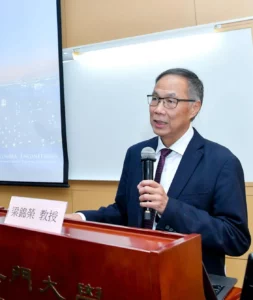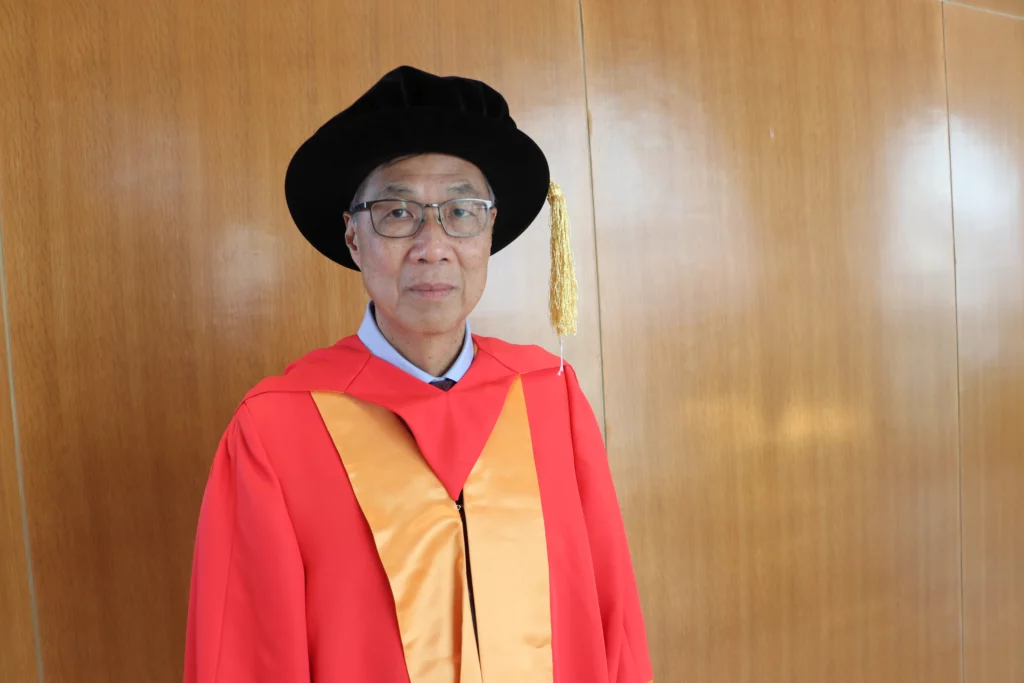Can you share with us why you went to the US to study after secondary school? Why did you choose to study Chemical Engineering?
Leong: I have always been interested in academics, and I treasure the opportunity to go abroad. This opportunity was given to me by my siblings and mother. I was very lucky because I was the youngest, so I was given this opportunity. In fact, no one suggested that I should study Chemical Engineering, but I thought I was pretty good in Chemistry and Mathematics, so I chose Chemical Engineering, which I considered to be a practical major. I didn’t have a thesis for my Bachelor’s degree, but for my PhD, I had a thesis related to the Synthesis and Applications of Graphite Intercalation Compound, which was about a polymeric composite. At that time, it was a relatively basic research to see whether graphite could be converted from an insulator to a semiconductor. Then I applied for postdoctoral research associate, and I had several offers. When I went to MIT to meet with my future professor, I thought that the drug delivery he was working on had a great future and could have a great impact on human health, so I was very interested in it. From then on, starting with my postdoctoral research, all of my academic career has been about biomedicine.
You made a speech in UM about focused ultrasound-enhanced gene editing and Alzheimer’s disease treatment. What other research are you working on?
Leong: In summary, I do drug and gene delivery. I have been doing this for 20 to 30 years. Gene editing is a specialty of gene delivery. Gene editing is one of the most exciting scientific breakthroughs of the last decade. Another major direction is regenerative medicine. To go deeper, it is human tissue on chip, that is, using induced pluripotent stem cells to generate a 3D tissue to mimic human tissue, which can be used for disease modeling and drug screening.
The field of human tissue on a chip is quite large and may be particularly suitable for China. Nowadays, the research and development of new drugs takes 12 to 15 years, and the cost of development is upward of US$2.5 billion. Even then, the drug still can fail, so new drug development is very costly. The reason for failure is that it is often difficult to find the most suitable population for testing the drug in clinical trials. Now there is a very impactful technology of using human induced pluripotent stem cells, the technology that earned Japanese scientist Shinya Yamanaka the Nobel Prize in Medicine.
Now a lot of people can do it, we (in our labs in the US) can do it. All I need is 20 ml of blood, and then I can generate induced pluripotent stem cells, and from those cells, I can generate any cell types, and from that cell type I can generate 3D tissue to mimic human tissues, and with that human tissue I can test the drug sensitivity and efficacy, and do a lot of biological research.
Now Macau has a great advantage, they have very good funding in the Greater Bay Area, and professors in Macau can get resources to do research in this area.
Why is human tissue on a chip particularly suitable for China?
Leong: I think that, from the data I know from a few years ago, 80-90% of the advanced drugs in China now are imported. China would definitely need to develop its own drugs. My view is that this technology of tissue on a chip can have a great impact on drug development. The human tissue on a chip that I am talking about cannot completely replace animal study, that we still have to do animal study, but it is much better than the cell culture that we are doing now. The cell culture now is 2D, but cells in our body are 3D. At least using this kind of tissue to do cell culture will be much better. Although it can’t completely replace animal study, it has a higher predictive power.
Another major shortcoming in drug development nowadays is that it is done in rats, rabbits and dogs. Their responses are different from those of human beings, and there is a big difference. Now we use human cells and human tissues, it is closer to the human response and has a higher predictive power. The success rate may be a little higher, but even if it is just a little higher, it is already a significant developmental cost.

Now that we have this technology, China can apply it and develop its own drugs without being restricted by imports, which is particularly necessary for China. My view is that, for example, in the development of telecommunications, China has skipped the whole generation of ground lines, from having very few telephones, to suddenly go completely wireless. China is very lucky because it has skipped a lot of generations. I think it is also possible to do the same thing in this case, to skip a lot of the traditional steps in drug development and to use human mimicking tissues.
According to your observation, what is the level of development of biomedical research in the Mainland?
Leong: The level is quite high. The scope of biomedical research is very wide and there are many aspects. One of the topics is called nanomedicine, that is, to encapsulate drugs into nanoparticles, which can improve drug efficacy and reduce toxicity. In fact, in nanomedicine, China is now leading the world, in both quantity and can match the best in the world. Working with them, I feel that the students are very diligent and the professors are very smart.
In terms of biomedical sciences, the University of Macau also has a weakness because it does not have its own medical school and cannot cooperate with a good hospital
You are a Distinguished Visiting Scholar at the Institute of Chinese Medical Sciences of UM in 2019. What do you think is the current level of biomedical research at the University of Macau?
Leong: It’s very good. I think the resources are good, the physical environment is good, the leadership is good. I think the only thing that is more difficult is that the history is still relatively short anyway, and it is still difficult to attract the best students, and it is still a challenge. In terms of biomedical sciences, the University of Macau also has a weakness because it does not have its own medical school and cannot cooperate with a good hospital, which makes it more difficult. But with smart professors and smart students, I guess it is a matter of time to catch up.
Complexo de Cuidados de Saúde das Ilhas — Centro Médico de Macau do Peking Union Medical College Hospital will be opened soon. Do you think UMAC can cooperate with this hospital?
Leong: Yes. Now Macau has a great advantage, they have very good funding in the Greater Bay Area, and professors in Macau can get resources to do research in this area.
If Macau wants to make more progress in scientific research, what would you suggest?
Leong: There may be a need for more investment in infrastructure, for example, in biomedical research, which requires a lot of animal studies, or rapid access to biochemical materials. Better access to these resources will facilitate and help accelerate biomedical research.



